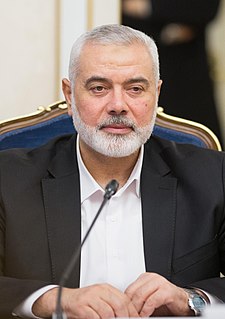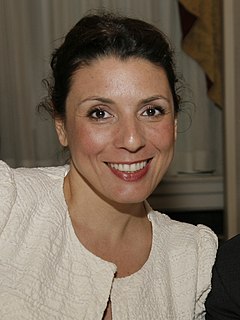A Quote by Elliott Abrams
Needless to say, if the Arab-Israeli conflict is about interstate disputes and the need to resolve the future of the West Bank and Gaza, it can be solved; if it is a religious conflict, nothing but violence is ahead.
Related Quotes
When you have a conflict, that means that there are truths that have to be addressed on each side of the conflict. And when you have a conflict, then it's an educational process to try to resolve the conflict. And to resolve that, you have to get people on both sides of the conflict involved so that they can dialogue.
I consider both the West Bank and Gaza to be colonised, even though Gaza is not occupied in the same way that the West Bank is. The Israeli government and military control all goods that pass in or out of that area, and they have restricted employment and building material that would allow Palestinians to rebuild homes and structures that were destroyed by bombardment.
A peaceful resolution to the Israeli-Palestinian conflict will likely depend to a great extent on the economic development of a future Palestinian state. As I have argued before, private sector investment - especially in the West Bank - is going to prove crucial in creating the right political and social context for peace.
It was tricky [to write about Israelis], because everyone has an opinion about the Arab - Israeli conflict, and when I first started writing these stories, I was working for an Arab - Israeli human rights group. It was during the Second Intifada. It was this totally violent and intense time, and I think there's a part of me where I don't know how to write about that situation without getting my politics out of my messages, and that's something that was important for me not to do in this book.
From the U.S. point of view, negotiations are, in effect, a way for Israel to continue its policies of systematically taking over whatever it wants in the West Bank, maintaining the brutal siege on Gaza, separating Gaza from the West Bank and, of course, occupying the Syrian Golan heights, all with full U.S. support.
He is someone who is involved in the Israeli-Palestinian conflict in a fundamental way. Let's start with who Dani Dayan is. He was the former head of one of the main settler councils, the Yesha Council, which is a kind of umbrella organization for settlements in the occupied West Bank. Now, you know, for some countries this might not be an issue, but Brazil has made a point of its policies on the Israeli-Palestinian issue.
I found that looking at the Israeli/Palestinian conflict from an outside vantage point was actually quite distancing. The history of the conflict, the personalities, the violence, the distrust, and the seeming lack of viable solutions made meaningful involvement feel impossible. What changed that, for me, was changing the vantage point.
The Israeli-Palestinian problem becomes very acute with Gaza dominated by Hamas. With the possibility of the conflict escalating, not only in terms of Gaza but also the Hezbollah and Lebanon, with the continuing crisis in Iraq, which is very dynamic and unpredictable and which could get out of hand, and maybe even escalate and enlarge.



































